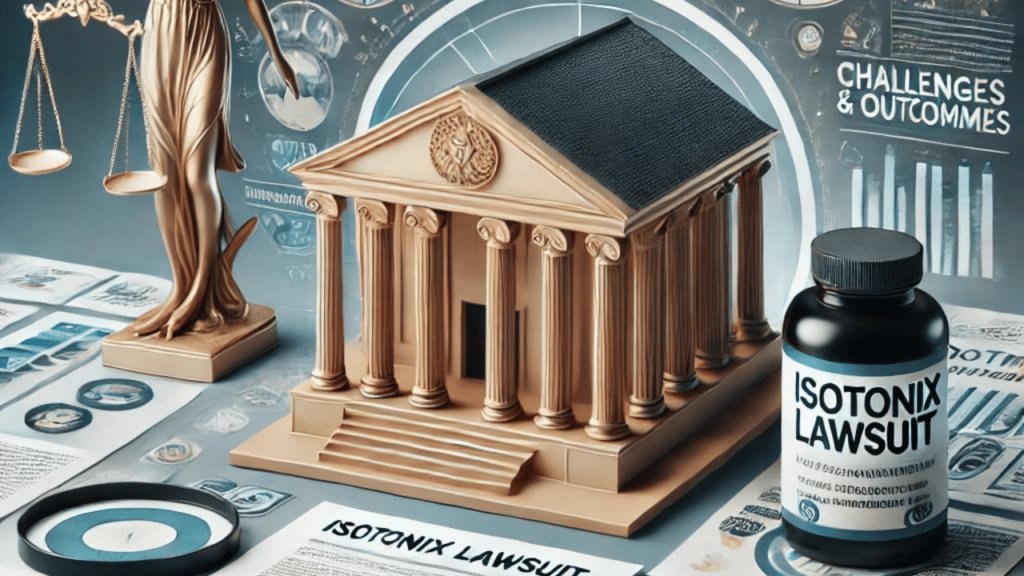Introduction
The dietary supplement industry has grown exponentially, with countless products promising to enhance health and well-being. However, this growth has been subject to controversy. A significant case that has caught public attention is the Isotonix lawsuit, which centers on allegations of misleading marketing practices and unsubstantiated health claims. This comprehensive article delves into the details of the Isotonix lawsuit, exploring the legal challenges faced by the company, the outcomes of the case, and the broader implications for the supplement industry.
Background of Isotonix and the Lawsuit
1.1 What is Isotonix?
Isotonix is a brand of dietary supplements that differentiates itself through its isotonic delivery system. When mixed with water, the company claims that its supplements have the same osmotic pressure as bodily fluids, allowing for rapid and efficient absorption in the small intestine. This feature is marketed as providing superior bioavailability compared to traditional tablets or capsules, which may require digestion and breakdown before absorption.
1.2 The Legal Issue: Basis of the Lawsuit
The Isotonix lawsuit emerged from a combination of consumer complaints and regulatory scrutiny. At the heart of the lawsuit were allegations that the company made exaggerated claims about the efficacy of its products. According to plaintiffs, these claims were not adequately supported by scientific research. The lawsuit accused the company of engaging in deceptive marketing practices, misleading consumers about the benefits they could expect from using Isotonix products.
1.3 The Role of Regulatory Bodies
Regulatory bodies such as the Federal Trade Commission (FTC) and the Food and Drug Administration (FDA) have been involved in monitoring and regulating health claims in the supplement industry. In the case of Isotonix, the lawsuit brought attention to the need for these bodies to enforce regulations more actively to prevent misleading claims. The involvement of regulatory bodies added a layer of complexity to the lawsuit, as it questioned the adequacy of existing regulatory frameworks.
Legal Challenges Faced
2.1 Claims and Counterclaims
The legal battle between Isotonix and the plaintiffs was multifaceted. On one side, the plaintiffs argued that Isotonix’s health benefits were exaggerated and not backed by sufficient scientific evidence. They contended that the marketing of these products misled consumers into believing they would receive specific health benefits that were not scientifically proven.
On the other hand, Isotonix defended its marketing practices by citing studies and testimonials that it claimed supported the benefits of its products. The company argued that the isotonic delivery system offered superior absorption, and its claims were based on legitimate scientific principles.
2.2 The Challenge of Proving Scientific Claims
One of the significant challenges in the lawsuit was proving the scientific validity of Isotonix’s claims. In the supplement industry, providing definitive proof of a product’s efficacy is often difficult due to the variability in individual responses to supplements. Additionally, the regulatory standards for supplements are less stringent than those for pharmaceuticals, which adds to the challenge of holding companies accountable for their claims.
2.3 The Legal Process and Burden of Proof
The legal process required a detailed examination of the evidence presented by both sides. The plaintiff’s burden of proof rested on demonstrating that Isotonix’s claims were misleading and had caused harm or potential harm to consumers. This included providing evidence that consumers had been misled and had purchased products under pretenses.
Outcomes of the Lawsuit
3.1 Court Rulings and Settlements
The Isotonix lawsuit resulted in several significant court rulings. In some cases, courts found that the evidence provided by Isotonix was insufficient to substantiate their claims. This led to rulings that required the company to change its marketing practices, including removing or altering specific claims about the benefits of its products.
In addition to court rulings, settlements were reached between the parties. These settlements often included financial compensation for plaintiffs and agreements to modify marketing strategies. The settlements highlighted companies’ willingness to avoid prolonged litigation, which can be costly and damaging to their reputation.
3.2 Impact on Isotonix and the Industry
The lawsuit had a substantial impact on Isotonix, affecting both its brand reputation and financial health. The negative publicity surrounding the lawsuit led to a loss of consumer trust and a potential decrease in sales. For the industry, the lawsuit underscored the risks of making unsubstantiated health claims and the importance of adhering to regulatory guidelines.
The case also served as a wake-up call to other companies in the supplement industry. It demonstrated that regulatory bodies and consumers are increasingly vigilant about the accuracy of health claims. Companies were reminded of the importance of transparency and the need to back up their claims with solid scientific evidence.
Broader Implications and Lessons Learned
4.1 Consumer Awareness and Protection
The Isotonix lawsuit highlighted the critical role of consumer awareness and protection in the dietary supplement market. Consumers were reminded of the importance of being skeptical of health claims and seeking out products that have been rigorously tested and proven effective. The case also emphasized the need for better consumer education to evaluate supplement claims’ credibility.
4.2 Regulatory Reforms and Industry Standards
One of the lawsuit’s broader implications was the potential for regulatory reforms. The case highlighted the gaps in current regulations and the need for more stringent enforcement. It suggested that regulators might need to adopt more rigorous standards for the evidence required to support health claims made by supplement companies. This could include stricter guidelines for clinical trials and more comprehensive disclosure requirements for companies.
4.3 The Role of Scientific Research
The lawsuit underscored the importance of scientific research in substantiating health claims. It highlighted the need for companies to invest in high-quality, peer-reviewed research to support their product claims. This protects consumers and helps build trust in the industry by ensuring that products are safe and effective.
FAQs
What was the central issue in the Isotonix lawsuit?
How did the lawsuit affect Isotonix?
What challenges are there in regulating dietary supplements?
What should consumers learn from the Isotonix lawsuit?
How might the Isotonix lawsuit influence future industry regulations?
Conclusion
The Isotonix lawsuit is a pivotal case in the supplement industry, illustrating companies’ legal and ethical challenges in marketing their products. It highlights the need for greater transparency and regulation to protect consumers and maintain trust in the industry. As the market for dietary supplements continues to grow, the lessons learned from this case will be crucial in shaping future industry practices and regulations.
You May Also Read: Discovering About the debsllcorg Site: Everything You Need to Know

